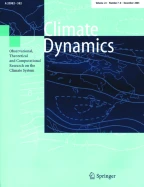Abstract
This study examines the impact of greenhouse gas warming on soil moisture based on predictions of 15 global climate models by comparing the after-stabilization climate in the SRESA1b experiment with the pre-industrial control climate. The models are consistent in predicting summer dryness and winter wetness in only part of the northern middle and high latitudes. Slightly over half of the models predict year-round wetness in central Eurasia and/or year-round dryness in Siberia and mid-latitude Northeast Asia. One explanation is offered that relates such lack of seasonality to the carryover effect of soil moisture storage from season to season. In the tropics and subtropics, a decrease of soil moisture is the dominant response. The models are especially consistent in predicting drier soil over the southwest North America, Central America, the Mediterranean, Australia, and the South Africa in all seasons, and over much of the Amazon and West Africa in the June–July–August (JJA) season and the Asian monsoon region in the December–January–February (DJF) season. Since the only major areas of future wetness predicted with a high level of model consistency are part of the northern middle and high latitudes during the non-growing season, it is suggested that greenhouse gas warming will cause a worldwide agricultural drought. Over regions where there is considerable consistency among the analyzed models in predicting the sign of soil moisture changes, there is a wide range of magnitudes of the soil moisture response, indicating a high degree of model dependency in terrestrial hydrological sensitivity. A major part of the inter-model differences in the sensitivity of soil moisture response are attributable to differences in land surface parameterization.
Similar content being viewed by others
References
Chen TH et al (1997) Cabauw experimental results from the Project for Intercomparison of Land-Surface Parameterization Schemes. J Clim 10:1194–1215
Douville H, Chauvin F, Planton S, Royer JF, Salas-Melia D, Tyteca D (2002) Sensitivity of the hydrological cycle to increasing amounts of greenhouse gases and aerosols. Clim Dyn 20:45–68
Giorgi F, Mearns LO (2002) Calculation of average, uncertainty range, and reliability of regional climate changes from AOGCM simulations via the “reliability ensemble averaging” (REA) method. J Clim 15:1141–1158
Gregory JM, Mitchell JFB, Brady AJ (1997) Summer drought in northern mid-latitudes in a time-dependent CO2 climate experiment. J Clim 10:662–686
Kellogg WW, Zhao ZC (1988) Sensitivity of soil moisture to doubling of carbon dioxide in climate model experiments, Part I: North America. J Clim 1:348–366
Koster RD, Suarez MJ (2001) Soil moisture memory in climate models. J Hydrometeorol 2:558–570
Manabe S, Wetherald RT, Stouffer RJ (1981) Summer dryness due to an increase of atmospheric CO2 concentration. Clim Change 3:347–386
Manabe S, Wetherald RT (1987) Large-scale changes of soil wetness induced by an increase in atmospheric carbon dioxide. J Atmos Sci 44:1211–1235
Manabe S, Wetherald RT, Milly PCD, Delworth TL, Stouffer RJ (2004a) Century-scale change in water availability: CO2-quadrupling experiment. Clim Change 64:59–76
Manabe S, Milly PCD, Wetherald RT (2004b) Simulated long-term changes in river discharge and soil moisture due to global warming. Hydrol Sci J 49:625–642
Meehl GA, Washington WM (1988) A comparison of soil-moisture sensitivity in two global climate models. J Atmos Sci 45:1476–1492
Milly PCD (1992) Potential evaporation and soil moisture in general circulation models. J Clim 5:209–226
Milly PCD, Wetherald RT, Dunne KA, Delworth TL (2002) Increasing risk of great floods in a changing climate. Nature 415:514–517
Mitchell JFB, Warrilow DA (1987) Summer dryness in northern mid-latitudes due to increased CO2. Nature 330:238–240
Nakicenovic N, Swart R (eds) (2000) Special report on emission scennarios of the Intergovernmental Panel on Climate Change. Cambridge University Press, New York, 570 pp
New M, Hulme M, Jones PD (2000) Representing twentieth century space-time climate variability. Part 2: development of 1901-96 monthly grids of terrestrial surface climate. J Clim 13:2217–2238
Raisanen J, Palmer TN (2001) A probability and decision-model analysis of a multi-model ensemble of climate change simulations. J Clim 14:3212–3226
Robock A, Vinnikov KY, Srinivasan G, Entin JK, Hollinger SE, Speranskaya NA, Liu S, Namkhai A (2000) The global soil moisture data bank. Bull Am Meteorol Soc 81:1281–1299
Robock A, Mu MQ, Vinnikov KY, Trofimova IV, Adamenko TI (2005) Forty-five years of observed soil moisture in the Ukraine: no summer desiccation (yet). Goephys Res Lett 32:L03401, doi:10.1029/2004GL021914
Schlesinger ME, Mitchell JFB (1987) Climate model simulations of the equilibrium climate response to increased carbon dioxide. Rev Geophys 25:760–798
Seneviratne SI, Pal JS, Eltahir EAB, Schar C (2002) Summer dryness in a warmer climate: a process study with a regional climate model. Clim Dyn 20:69–85
Seneviratne SI, Koster RD, Guo Z, Dirmeyer PA, Kowalczyk E, Lawrence D, Liu P, Lu C-H, Mocko D, Oleson KW, Verseghy (2005) Soil moisture memory in AGCM simulations: analysis of Global Land-Atmosphere Coupling Experiment (GLACE) data. J Hydrometeorol, in review
Wetherald RT, Manabe S (1999) Detectability of summer dryness caused by greenhouse warming. Clim Change 43:495–511
Wetherald RT, Manabe S (2002) Simulation of hydrologic changes associated with global warming. J Geophys Res Atmosp 107:doi: 10.1029/2001JD001195
Acknowledgement
The author would like to acknowledge the international modeling groups for providing their data for analysis, the Program for Climate Model Diagnosis and Intercomparison (PCMDI) for collecting and archiving the model data, the JSC/CLIVAR Working Group on Coupled Modelling (WGCM) and their Coupled Model Intercomparison Project (CMIP) and Climate Simulation Panel for organizing the model data analysis activity, and the IPCC WG1 TSU for technical support. The IPCC Data Archive at Lawrence Livermore National Laboratory is supported by the Office of Science, U.S. Department of Energy. Drs. Sonia Seneviratne and Richard Wetherald are thanked for their constructive comments that improved the quality of the paper.
Author information
Authors and Affiliations
Corresponding author
Rights and permissions
About this article
Cite this article
Wang, G. Agricultural drought in a future climate: results from 15 global climate models participating in the IPCC 4th assessment. Clim Dyn 25, 739–753 (2005). https://doi.org/10.1007/s00382-005-0057-9
Received:
Accepted:
Published:
Issue Date:
DOI: https://doi.org/10.1007/s00382-005-0057-9
